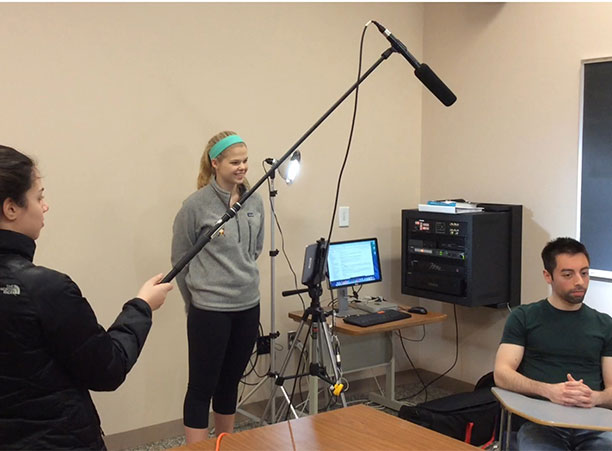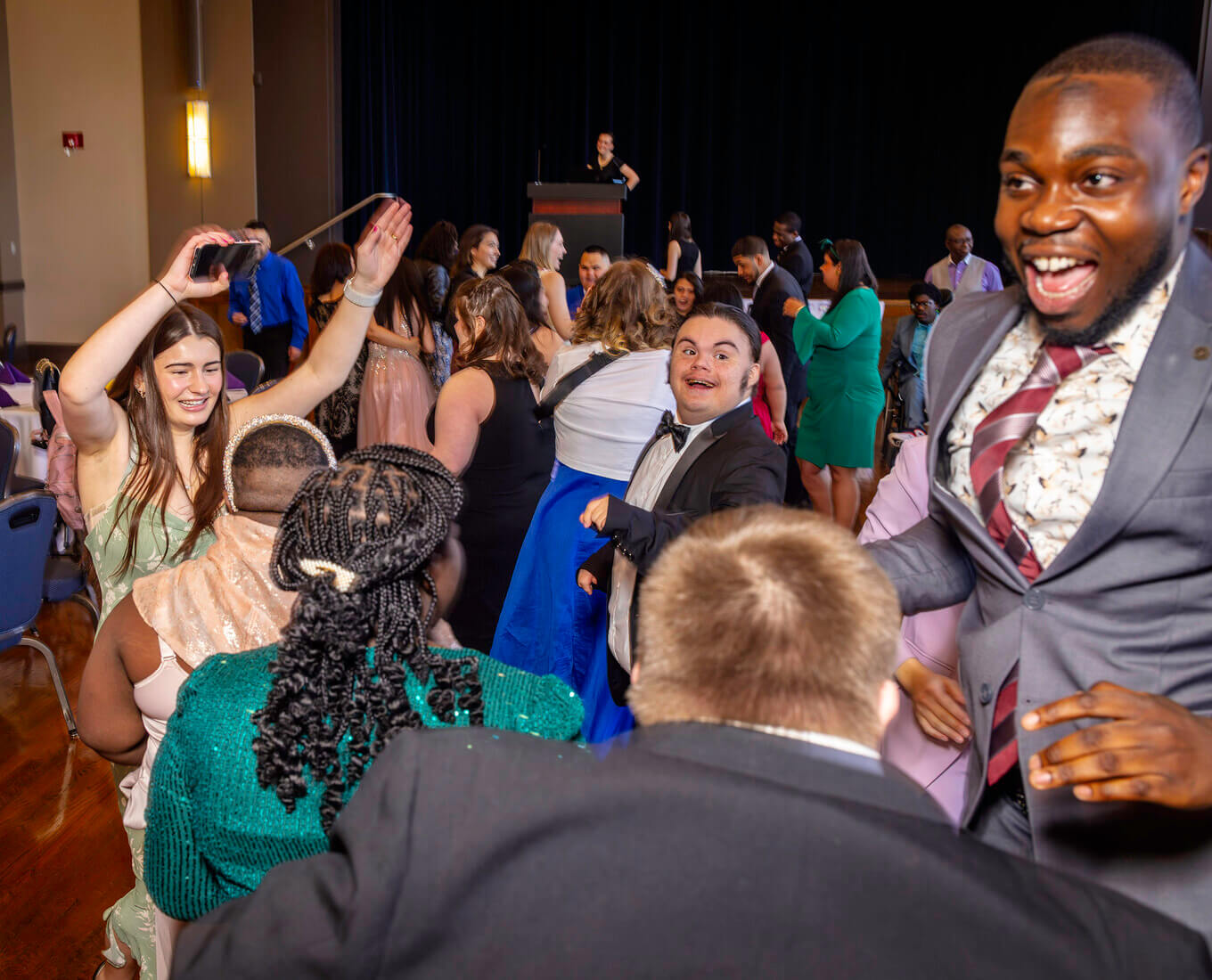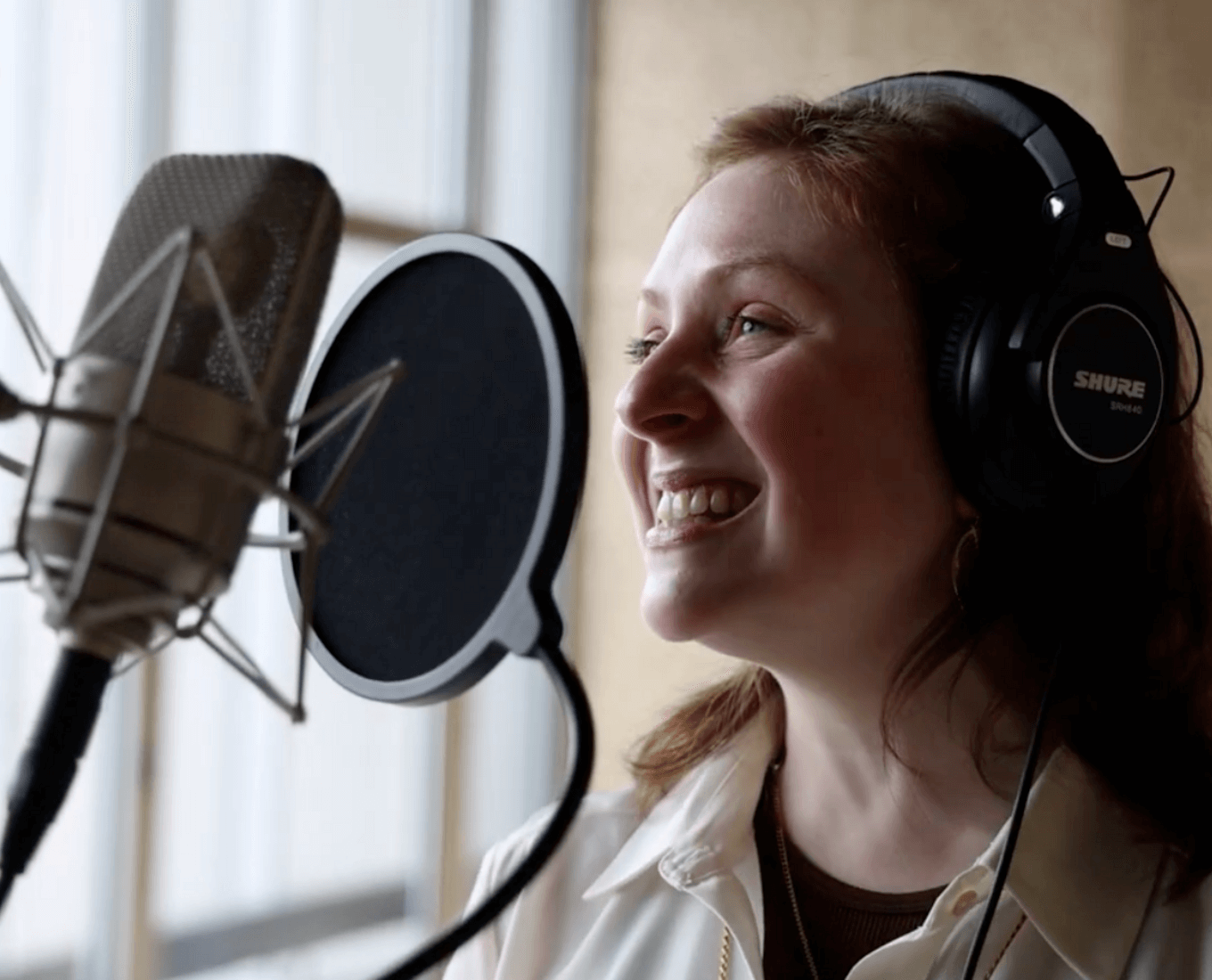 Last spring, the Spanish department at the College of the Holy Cross offered a unique opportunity for students interested in exploring and experimenting with core components of cinematographic production. The interactive and highly involved course titled “¡Acción! Filmmaking in Spanish,” provided hands-on learning approaches conducted entirely in the Spanish language and is designed to introduce students to the artistic and technical terminology employed in Spanish and Latin American film production.
Last spring, the Spanish department at the College of the Holy Cross offered a unique opportunity for students interested in exploring and experimenting with core components of cinematographic production. The interactive and highly involved course titled “¡Acción! Filmmaking in Spanish,” provided hands-on learning approaches conducted entirely in the Spanish language and is designed to introduce students to the artistic and technical terminology employed in Spanish and Latin American film production.
“Spanish and Latin American film is currently a hot topic in academia,” says Bridget Franco, assistant professor of Spanish, who designed and taught the course. “Despite the recent explosion of new courses related to Spanish and Latin American cinema, there is a visible lack of undergraduate classes taught in Spanish that focus primarily on the technical aspects of filmmaking and that result in the creation of original digital movies.”
Incorporating technology as a vital component to language learning, the course requires students to use and interact with iPads and iMovie digital editing software on a weekly basis, all in Spanish, of course. “This technology will not only help them [the students] to master the specific terminology but it will also require them to deploy their knowledge in a focused and applied manner outside of the classroom as they practice filming techniques, experiment with lighting and sound engineering, and digitally edit their creations,” Franco explains.
In addition, students are given the opportunity to take advantage of the exclusive online resource known as CINEGLOS. Created in 2011 by Franco in collaboration with two Holy Cross undergraduate researchers, CINEGLOS is an interactive Spanish-language audiovisual glossary of film terminology. Sheila Coursey ’13 and Kelsey Smith ’13 worked with Franco on this award-winning project as part of the Summer Research in the Humanities, Social Sciences, and Fine Arts. The database is comprised of more than 150 film terms defined in Spanish, cross-referenced, organized categorically and alphabetically, and linked to one or more video clips with moving illustrations of cinematographic techniques from critically acclaimed Spanish and Latin American films.
With access to this extensive digital resource, Franco flips the traditional lectures about camera angles, sound effects, film takes, and lighting outside the classroom, and focuses on interactive activities, problem-solving, and group work. The hands-on use of digital technology and the flipped classroom are part of her overall pedagogical strategy requiring students to experiment, struggle, make mistakes, and question traditional textbook knowledge. “These techniques form part of an active learning approach to teaching that has been shown to foster deep learning and excellence in undergraduate education,” Franco shares.
But students are not merely working within a classroom’s inventive syllabus. A Community-Based Learning (CBL) component encourages active collaboration between students and one of the College’s community partners in Worcester: Unaccompanied Refugee Minor Program at Ascentria Care Alliance or English as a Second Language and mentoring programs at Assumption Center. These collaborations require students to design, produce, and edit a short promotional, documentary film that will serve the needs of the organization’s Spanish-speaking clients. The CBL component fosters the College’s strong commitment to community, offering students a chance to “connect academic learning with civic engagement.”
Meghan Kelly ’17, currently studying abroad through the College in La Coruña, Spain, took Franco’s course. Her final film project involved working with Ascentria to create a training video for foster parents who host unaccompanied refugee minors. While the film was narrated in English for the target audience, Kelly and her project partners conducted their interviews with the refugee minors entirely in Spanish. Rather than a language barrier, the productive exchange opened up a dialogue between students and refugees. “They [the refugees] were able to laugh at the silly grammatical errors we made,” Kelly says. “…we joked around a lot…We heard some of the most eye-opening stories about adolescents crossing the border alone from their home countries in Central America.”
Although a passion for filmmaking may not have been Kelly’s focus for taking the course, the experience moved her in such a way that by the end she said “We all agreed it [the final project] really made us feel like we had done something to make a difference in the Worcester community. It was truly so gratifying to see how we touched the lives of the youth, and, even more so, how they touched ours.”
Another past student of Franco’s, Cassandra Kobelski ’17, who studied abroad in Argentina this past semester, says, “This class helped me to not only better understand aspects of the Spanish and Latin American community in Worcester, but also gave me the opportunity to interact with important leaders in the community.” She credits the experience for great improvements in her conversational Spanish. Kobelski found that through working with those communities in Worcester, her exposure to many different dialects of Spanish gave her an advantage to her study abroad experience. “It helped prepare me for the various speeds, accents, and vocabulary that you can encounter not only within a country but a city as well.”
Franco’s efforts to instill community awareness in her students have helped them to become greater than their textbooks and exams. “These experiences are invaluable to expand your horizons,” Kobelski explains. “Through CBL, students are reminded that our community is not limited to Mount St. James and that by branching out we can both accomplish the mission to be men and women for others.”
Teaching so much more than proficiency in Spanish, Franco’s course has touched many lives. Sister Catherine Soley, from Assumption College, was one of the community partners that worked with the students on their films through the CBL partnership. “I have enjoyed and been inspired by her [Franco’s] enthusiasm and willingness to extend the boundaries of her teaching and of the expectations of the students for themselves,” she says. Soley admired Franco’s ability to strike a balance between pushing her students to go beyond their own expectations while still giving them the support needed to not feel overwhelmed.
“One of the marks of success, for me,” Soley, says, “was that I really felt their [the students’] film caught and communicated the charism or spirit of the ministry of my congregation. We are primarily educators, working in less formal settings. In all our work, building community is paramount.”
Franco hopes to offer the course again next fall.
Holy Cross Spanish Professor Encourages Interactive Creativity in the Classroom and Beyond
Students create informational videos for Worcester non-profits
Read Time
5 Minutes


